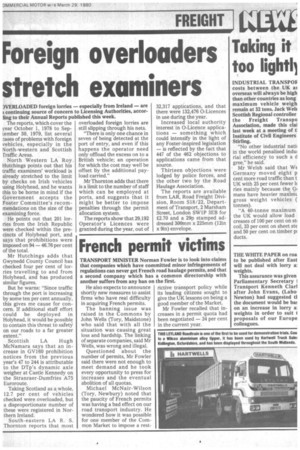Foreign overloaders stretch excuniners
Page 19

If you've noticed an error in this article please click here to report it so we can fix it.
WERLOADED foreign lorries — especially from Ireland — are continuing source of concern to Licensing Authorities, accoriing to their Annual Reports published this week.
The reports, which cover the year October 1, 1978 to September 30, 1979, list several cases of problems with foreign vehicles, especially in the North-western and Scottish Traffic Areas.
North Western LA Roy. Hutchings points out that his traffic examiners' workload is already stretched to the limit by checks on Irish vehicles using Holyhead, and he wants this to be borne in mind if the Government accepts the Foster Committee's recommendations on the size of the examining force.
He points out that 201 lorries from the Irish Republic were checked within the precincts of Holyhead port, and says that prohibitions were imposed on 94 — 46.76 per cent of the total.
Mr Hutchings adds that Gwynedd County Council has checked four per cent of lorries travelling to and from Holyhead, and has produced similar figures.
But he warns: "Since traffic through the port is increasing by some ten per cent annually, this gives me cause for concern. If additional staff effort could be deployed in Holyhead, it would be possible to contain this threat to safety onon our roads to a far greater extent."
Scottish LA Hugh McNamara says that an increase in GV160 prohibition notices from the previous year's 47 to 244 is attributable to the DTp's dynamic axle weigher at Castle Kennedy on the Stranraer-Dumfries A75 Euroroute.
Taking Scotland as a whole, 12.7 per cent of vehicles checked were overloaded, but a disproportionate number of these were registered in Northern Ireland, South-eastern LA R. S. Thornton reports that most overloaded foreign lorries are still slipping through his nets.
"There is only one chance in seven of being detected at the port of entry, and even if this happens the operator need only offload the excess on to a British vehicle; an operation for which the cost may well be offset by the additional payload carried."
Mr Thornton adds that there is a limit to the number of staff which can be employed at ports, and suggests that it might be better to impose penalties through the permit allocation system.
The reports show that 29,192 Operator's Licences were granted during the year, out of 32,317 applications, and that there were 132,476 0-Licences in use during the year.
Increased local authority interest in 0-Licence applications — something which could intensify in the light of any Foster-inspired legislation — is reflected by the fact that 447 of the 462 objections to applications came from that source.
Thirteen objections were lodged by police forces, and the other two by the Road Haulage Association.
The reports are available from LAR, Road Freight Division, Room S18/22, Department of Transport, 2 Marsham Street, London SW1P 3EB for £2.70 and a 29p stamped addressed 300mm x 225mm (12in x 9in) envelope.




























































































































